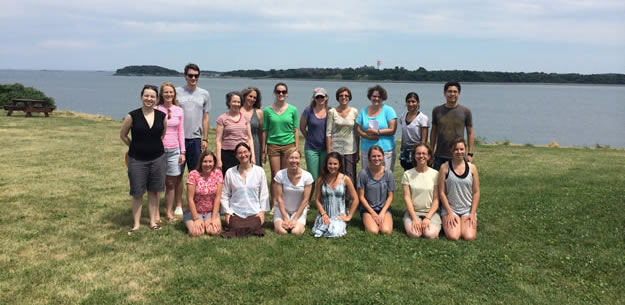Caitlin Knowles Completes Cancer Research Internship

She’s one of the top students in Huntington High School’s Class of 2015, but Caitlin Knowles never sits back and rests on her laurels. The teenager spent two weeks this summer engaged in a cancer research internship at Silent Spring Institute outside of Boston.
The Huntington scholar’s participation in the internship program was sponsoring by the Huntington Breast Cancer Action Coalition. “I had a few projects relating to water quality while I was there and I am continuing to do some work for my mentors now that I’m home,” Ms. Knowles said.
The recording secretary of the Huntington High School GO, Ms. Knowles earned varsity athletic letters in soccer, basketball and lacrosse last year. The teenager is one of seven Huntington seniors to qualify for the 2015 National Merit scholarship program.
 Ms. Knowles called the summer internship an “incredible opportunity.” She worked with research scientist Dr. Laurel Schaider and research assistant Kathryn Rodgers on projects concerning emerging environmental contaminants in drinking water and wastewater.
Ms. Knowles called the summer internship an “incredible opportunity.” She worked with research scientist Dr. Laurel Schaider and research assistant Kathryn Rodgers on projects concerning emerging environmental contaminants in drinking water and wastewater.
Week No. 1 Focused on Compiling Data
“The first week I focused on compiling data from the EPA’s unregulated contaminant monitoring rule three (UCMR3),” Ms. Knowles said. “The EPA uses the UCMR3 to monitor the concentrations of drinking water contaminants that are not presently regulated, but may be regulated in the future. Public water systems across the country are selected by the number of people they serve to take samples from each of their facilities, test for the required contaminants and report their data back to the EPA. The selected contaminants are usually suspected of causing specific health effects. To keep concentrations at a safe level, the EPA will combine data from the UCMR3 and laboratory tests of health effects to establish a maximum contaminant level, the greatest concentration at which a contaminant can legally be present in drinking water, for each substance as a regulatory guideline.”
Ms. Knowles said her work mostly focused on perfluorinated chemicals (PFCs) and several hormones. “PFCs are chemicals with extremely strong bonds that are commonly used in airplane anti-icing agents, fire-fighting foams, nonstick pans, and stain-proof products,” she said. “Due to their strong bonds, PFCs do not break down easily, so they persist in the environment for long periods of time. The presence of PFCs is concerning because they have been shown to have negative health impacts such as breast cancer, altered thyroid hormone levels, birth defects and immune system problems. I looked at these specific contaminants to compare data the EPA had gathered on Cape Cod and in the whole United States to previous experiments conducted by Silent Spring measuring contaminants in public and private wells on the Cape.”
 Following an examination of the data, Ms. Knowles said it was evident that the number of samples above the minimum reporting level (MRL), which is the lowest concentration at which a researcher can be certain the contaminant is present, was very small (less than one percent) for each contaminant and experimental area.
Following an examination of the data, Ms. Knowles said it was evident that the number of samples above the minimum reporting level (MRL), which is the lowest concentration at which a researcher can be certain the contaminant is present, was very small (less than one percent) for each contaminant and experimental area.
“For those samples that were above the MRL, samples from Cape Cod made up a disproportionally high percentage of those from Massachusetts,” Ms. Knowles said. “Samples from Massachusetts were a sizeable percentage of all U.S. samples above the MRL. This information will help Silent Spring researchers put their own drinking water studies into a broader context and will be useful for future work that hopes to understand the sources of perfluorinated chemicals in drinking water.”
Helped Create Eco-Toilet Video
The second week of her internship saw Ms. Knowles grappling with the task of creating an eco-toilet video for Silent Spring.
“Recently, Silent Spring has been conducting an eco-toilet sampling project, collecting water samples from the septic systems of several Cape Cod residents before and after they installed eco-toilets,” the Huntington senior said. “Eco-toilets are designed to either divert toilet waste from septic systems, which prevents nitrogen (implicated in algae blooms and impaired water qualify) along with other contaminants eliminated from our bodies from entering the groundwater, which in the case of Cape Cod feeds resident’s drinking water wells. The Silent Spring researchers hypothesize there will likely be lower concentrations of hormones, pharmaceuticals and consumer product chemicals in septic systems and underlying groundwater as a result. Dr. Schaider, Kathryn Rodgers, and Tara Krishna, another summer intern had already recorded the sampling footage, so I was mainly in charge of editing and creating the final product. When the video was finished, I presented it along with my findings from the first week’s project to a crowd that included almost all of Silent Spring’s staff members.”
 While Ms. Knowles found the research opportunities to be “very interesting,” she also enjoyed the hours outside of work. “While in Massachusetts, I stayed at a very nice bed and breakfast in Newton, so I was able to go to many restaurants in the area for dinner after going for a run or exploring the town,” she said. “I also got to visit several places in Boston, including the North End, Faneuil Hall and five different colleges. I was even allowed to join in the annual Silent Spring staff retreat at Spectacle Island. Silent Spring is nearing its 20th anniversary, so it was extremely interesting to hear how far the Institute has come through the accounts of several veteran staff members.”
While Ms. Knowles found the research opportunities to be “very interesting,” she also enjoyed the hours outside of work. “While in Massachusetts, I stayed at a very nice bed and breakfast in Newton, so I was able to go to many restaurants in the area for dinner after going for a run or exploring the town,” she said. “I also got to visit several places in Boston, including the North End, Faneuil Hall and five different colleges. I was even allowed to join in the annual Silent Spring staff retreat at Spectacle Island. Silent Spring is nearing its 20th anniversary, so it was extremely interesting to hear how far the Institute has come through the accounts of several veteran staff members.”
Ms. Knowles was happy to have been a member of Silent Spring’s research team, “even if it was only for a short time,” she said. “I truly had an amazing experience and I am thankful to everyone who helped to make this internship possible. Hopefully I will get the chance to come back in the future.”
